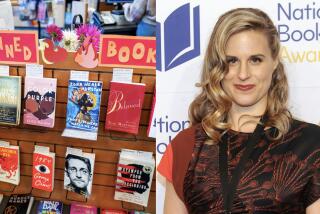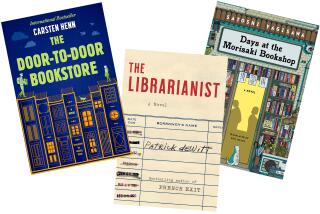Peerless Porker : Librarian Sings Praises of Fictional Friend Freddy, a Pig of Many Talents
- Share via
To Michael Cart, Freddy is “the pig o’ my heart.”
Freddy isn’t a live porker, but a fictional pig who talks and types and writes doggerel. And Cart, the 48-year-old director of the Beverly Hills Public Library, is president of the Friends of Freddy, an international league of men, women and children shamelessly stuck on the porcine hero of 26 children’s books written by the late Walter R. Brooks.
“I wish I could claim credit for founding the Friends of Freddy since I’ve been a friend of Freddy since I was 7 years old,” Cart said. But that distinction goes to Canadian playwright Dan Carley, who formed the group in 1983.
Today the society of Freddyphiles has more than 200 members who receive a quarterly newsletter, hold Freddyfests and work tirelessly, Cart says, “to spread Freddy’s name and fame throughout the known universe.”
First Encounter
Cart first encountered the “peerless porker,” as he has been known to call Freddy, in third grade while growing up in Logansport, Ind. Cart’s reader contained an excerpt from the first Freddy adventure, “To and Again,” published in 1927. Later, “as luck or fate or God would have it,” Cart discovered the whole book, along with subsequent tales of Freddy, on a shelf at his public library. “The rest,” he said, “is history.”
In Freddy’s day he was an extremely popular pig. Cart, who is writing a critical biography of Brooks, says 340,000 copies of the Freddy books were sold before Brooks died in 1958. In addition to books for children, Brooks wrote novels and short stories for adults, including a series featuring a talking horse named Ed, called Mr. Ed on television.
Freddy fanatics dependent on the public library for their fixes sometimes resorted to desperate measures. Friends founder Dan Carley confessed in an interview at the 1988 Freddyfest how he and his older brother worked their hometown public library together. “He was really strong,” Carley said of his sibling, “so when the children’s section of the library opened, he’d hold all the kids back while I ran in. I was well-coached as to which titles to get. Finally, we were slapped with a two-Freddy-books-a-week quota.”
The books were aimed at elementary schoolchildren, but Freddy fans clung to them long after their voices had changed. Brooks never wrote down to his young readers, Cart says, and the stories are very funny and characterized by wonderful wordplay.
To a child who was “literary” (rather like Freddy himself), the books were filled with verbal delights. Cart learned the meaning of the word sesquipedalianism, the big word that means using big words, from Brooks. “I ran to the dictionary many times when I was reading the Freddy books,” Cart recalls.
The books present an idyllic view of rural American life, Cart says, but their main magic, he believes, is their protagonist.
“Freddy,” Cart argues, “was a pig of many parts: poet, playwright, Pied Piper, pilot, politician . . . detective, newspaper editor, banker, magician, cowboy, peripatetic adventurer and, always, a friend--to both his fictional counterparts who lived with him on the Bean Farm in Upstate New York and to devoted readers like me who lived with him only in their imaginations.”
As a student of Freddy as well as an enthusiast, Cart is convinced that Freddy was Brooks’ alter ego. “Their emotional provenance,” Cart says of the books, “was clearly that of Brooks’ childhood.”
Cart too saw himself in the pig, “with his occasional bouts of hubris and vanity, which were always punctured.” Freddy, he added, “was the way I wanted to be in terms of his virtues. My God, how I wanted to have a friend like Freddy! If I couldn’t, I determined at an early age, I would be the kind of friend to other people Freddy always was.”
Perhaps most important, the Freddy books allowed Cart to escape, if only for a time, from the sometimes suffocating world of childhood. “The Freddy books were a source of spiritual nourishment,” he said. “They were a sanctuary and a refuge for me. Brooks had created a parallel universe, so that when things got tough in Indiana I could go off to the Bean Farm, where the quality of life was a little better.”
The first two Freddyfests were held near Roxbury, N.Y., in the Catskill Mountains where Brooks lived during his last years. His widow, Dorothy, who read the Freddy books aloud to Brooks in the months before he died, has welcomed the convening Friends into their home. Cart has even slept in Brooks’ bed. He also has the ancient Corona portable on which the pig was born.
A high point of the 1988 convention, Cart says, was the presentation of an endowment of $1,500 in Brooks’ memory to the Roxbury Public Library. The income will be used to buy children’s books. The third convention will be held in 1990 at a place yet to be decided.
When the friends of Freddy gather, they ponder such mysteries as why the Freddy books are no longer widely read and why the charismatic pig is not as famous as Uncle Wiggily or Babar. There are those who think Brooks influenced George Orwell’s “Animal Farm” and E. B. White’s conception of the pig Wilbur in “Charlotte’s Web.”
Yet all but one of the Freddy books was out of print until, at the urging of the Friends, Alfred A. Knopf reissued eight of the titles in 1986, with an introduction by Michael Cart. The books did not sell particularly well, much to the chagrin of the Friends, and additional titles are in doubt.
Nor has Freddy gone the animation route, despite the elegant illustrations Kurt Wiese did for the series. Hanna-Barbera had an option on Freddy, which it dropped. ABC now has an option on the stories but no current plans to turn them into Saturday-morning cartoons.
Children who can find the books love them still, Cart says, “even Beverly Hills kids.” The Beverly Hills Public Library has an almost complete set, and they circulate very well, he reports. “Chris Olson, the supervisor of children’s services, regularly brings children into my office to see my Freddy collection and the famous typewriter.”
Cart is so fond of Freddy that he is willing to look a little foolish in his service. Co-producer and host of a weekly cable TV show on books and authors called “In Print,” Cart makes no apologies for his unusual enthusiasm. Books matter, he believes, especially Freddy’s.
As to why, Cart cites the observation Brian Alderson, children’s book editor of the London Times, once made to him. “Books are only important,” Alderson said, “if you consider literature to be important. And literature is only important if you consider civilization to be important.”
More to Read
Sign up for our Book Club newsletter
Get the latest news, events and more from the Los Angeles Times Book Club, and help us get L.A. reading and talking.
You may occasionally receive promotional content from the Los Angeles Times.










